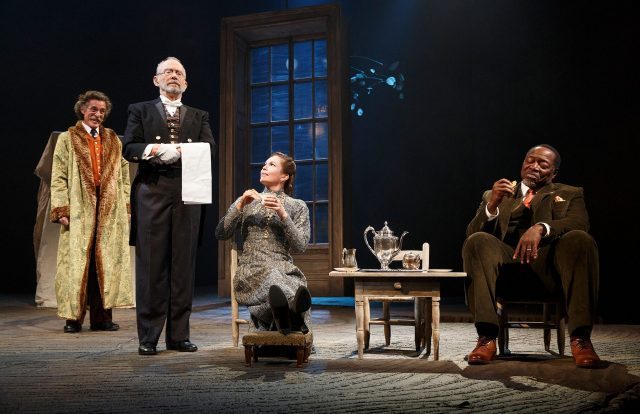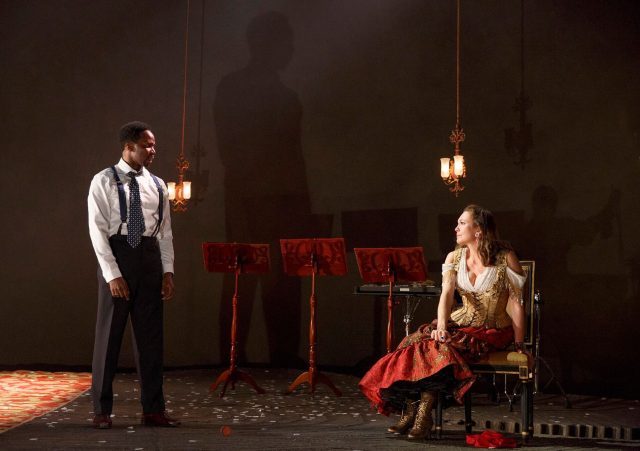
John Glover, Joel Grey, Diane Lane, and Chuck Cooper squeeze into new Broadway adaptation of THE CHERRY ORCHARD (photo by Joan Marcus 2016)
American Airlines Theatre
227 West 42nd St. between Broadway & Eighth Ave.
Tuesday – Sunday through December 4, $59-$149
212-719-1300
www.roundabouttheatre.org
Rising Roundabout scribe Stephen Karam takes a curious pause in his soaring career with a misbegotten adaptation of Anton Chekhov’s classic comic drama, The Cherry Orchard. Karam’s two previous plays, 2011’s Sons of the Prophet and 2014’s The Humans, were both finalists for the Pulitzer Prize, and the latter won the Drama Desk Award for Outstanding Play when it was off Broadway and then the Tony for Best Play after transferring to the Great White Way. But his new version of The Cherry Orchard, in an exasperating production helmed by National Theatre associate director Simon Goodwin (The Beaux’ Stratagem, Routes), is sour from the very start. Chekhov’s plot is familiar to most theatergoers: After living in Paris for five years following the death of her husband and the tragic drowning of her seven-year-old-son, Grisha, Madame Lyubov Andreyevna Ranevskaya (Diane Lane) returns to the family home with her entourage, only to find that the entire estate, including her beloved cherry orchard, is going to be sold at auction because of failure to pay off massive debts. Yermolai Alekseyevich Lopakhin (Harold Perrineau), a successful businessman whose father and grandfather worked as serfs on the estate, offers a plan to save the house by cutting down the orchard and replacing it with vacation villas, but Lyubov and her arrogant brother, Leonid Andreyevich Gaev (John Glover), will have none of it, acting like spoiled children, refusing to face the direness of their situation. Also refusing to accept reality is Lyubov’s daughter, Anya (Tavi Gevinson), and her adopted daughter, Varya (Celia Keenan-Bolger). The family circle is filled out by governess and magician Charlotta Ivanovna (Tina Benko), family friend and landowner Boris Borisovich Simeonov-Pischik (Chuck Cooper), local clerk Semyon Panteleyevich Yepikhodov (Quinn Mattfeld), Grisha’s former teacher and current student Pyotr Sergeyevich Trofimov (Kyle Beltran), maid (Dunyasha), young servant Yasha (Maurice Jones), and doddering old servant Firs (Joel Grey). In addition, violinist Bryan Hernandez-Luch, clarinetist Liam Burke, and percussionist Chihiro Shibayama add cinematic music first from the sidelines, then from the back of the stage. But it’s all for naught.

Lopakhin (Harold Perrineau) tries to convince Madame Lyubov (Diane Lane) of the fate of the cherry orchard in Roundabout revival (photo by Joan Marcus 2016)
Chekhov’s plays are ripe for reinterpretation. This year alone has brought the Pearl’s Stupid Fucking Bird and Peter Pan Theatre’s The Seagull and Other Birds, two wildly inventive reimaginings of The Seagull, while the Maly Drama Theatre of St. Petersburg’s production of The Cherry Orchard at BAM was a brilliant, immersive take on the tragicomedy. But Karam and Godwin throw too much into the mix, getting trapped in a no-man’s land between traditional and experimental, classical and contemporary, realistic and metaphorical. Michael Krass’s costumes are all over the place, from sharp, modern-day suits to old-fashioned Eastern European garb, as is Karam’s dialogue. “What is it you’d say . . . ?” Madame Lyubov asks Gaev early on. “What’s the lingo?” And stage directions such as “Varya and Anya share a moment of ‘What the hell was that?!’” certainly don’t help. Karam also shifts the idea of serfdom into slavery, which Godwin overdoes by casting black actors as Lopakhin, Trofimov, and Pischik. Most of the play takes place in the nursery, which set designer Scott Pask has outfitted with tiny chairs and tables, Alexander Calder-like mobiles hanging from the ceiling, a toy village, and a mobile of small hot-air balloons hovering over a child’s bed. Yes, we get it; virtually all of the characters are acting like children. And it turns out to be more cringe-worthy than funny when the rather large Cooper wiggles into one of the chairs. The floor is an enormous trunk of a tree that has been chopped down, its myriad rings representing the changing times and generations, evoking the eventual fate of the cherry orchard and the Russian aristocracy — as well as this production itself.